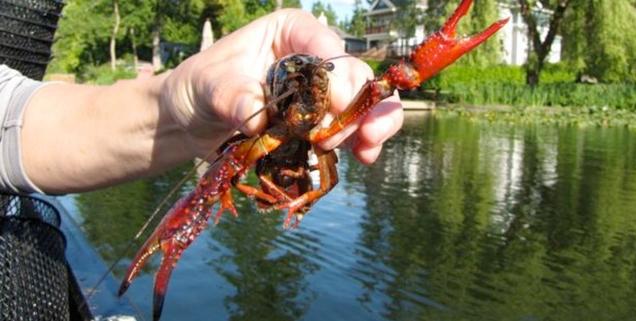Red crayfish invades Pacific Northwest waterways
The red swamp crayfish is native to the U.S. Gulf Coast, but has been introduced to lakes and waterways in the Pacific Northwest. (Photo by Ashley Ahearn.)
If you’re a fan of Gulf Coast cooking, you probably love gumbo and jambalaya. But those spicy delights are hardly the first thing you’d expect to find on menus in the temperate Pacific northwest.
That could be about to change though, as the invasive red swamp crayfish is now being found in some lakes in the northwest. The crayfish, or crawfish, or crawdad, is a native of the southeastern United States and the Gulf Coast, and notably delicious.
About 20 miles east of Seattle you’ll find Pine Lake. It’s a small body of water, only about 40 feet deep and lined with well-kept homes. Yellow labs patrol green lawns and sunny docks. Bass and trout fishermen share the water with laughing kids on paddleboards.
But beneath the surface‚ down in the depths of Pine Lake, there’s another neighbor: the red swamp crayfish.
Julian Olden sits in a canoe on Pine Lake. He pulls a flailing red crustacean out of a trap and holds it gingerly as it waves its claws around.
Olden is a freshwater ecologist with the University of Washington. Over the past several years he’s been setting traps around this lake to monitor the advance of these aggressive intruders. He puts the red crayfish down and it scuttles around the bottom of the canoe, dangerously close to his bare toes.
“It’s about 4-5 inches length total, so that’s what you’d expect to see,” he said.
Olden says these intruders could be changing the native ecosystem. The red swamp crayfish eat tadpoles, bass and trout eggs. They also munch through the plants that line the bottoms of lakes like this one.
“By basically being an underwater lawnmower, they’re removing the home and cover for a lot of those native fish,” he said.
Pine Lake might be ground zero for the red swamp crayfish invasion. A biologist discovered them here in 2000, but they’ve since shown up in nine other lakes in Washington, as well in Idaho and in the Willamette River along the Washington-Oregon border.
This wasn’t natural colonization. In at least one instance, these crayfish were intentionally released after being used for research or as classroom pets.
But on this lake, the red swamp crayfish have been met with some local opposition. Olden pulls up another trap and out plops a member of the hometown team‚ a Signal crayfish.
Signal crayfish have lived in this region for the past 10,000 years or so. But Olden’s research has found that at Pine Lake anyway, they’ve been overtaken by the red swamp crayfish.
The blue-shelled locals don’t breed as often as their crimson competition, and when they do, they don’t produce as many offspring. They also prefer cooler temperatures so in the future, things may not look good for them.
For now, though, Renee Henderson and her daughter Solana are lending a hand to the Signal crayfish.
Pine Lake homeowners are working with Olden to trap the invasive crayfish. At 8 years old, Solana is one of the lead trappers.
“I pretty much don’t know (how many I’ve caught) because we’ve got a lot,” she said, proudly.
But when pressed to guess, she provided a surprisingly specific answer: 48.
Her mom says the youngster is obviously into science — a passion this project has fed.
“We’ve done a lot of googling recipes for crawfish pie, crawfish boil. It’s been good for her just learning about the environment and how to protect it,” Henderson said.
All the participants in Olden’s study keep data sheets tallying up how many crayfish they catch, and what the breakdown is between red swamp crayfish and the native Signal crayfish. So far this year Pine Lake residents have trapped and removed around 500 red swamp crayfish.
Olden says some years they’ll catch upwards of 800 of them.
“On days like this with all these people with traps in the water you’re pretty inspired, knowing that hey we might have a chance — not to remove them‚ eradicating them is pretty much impossible — but controlling them to low enough level where their impacts are minimized,” he said.
We want to hear your feedback so we can keep improving our website, theworld.org. Please fill out this quick survey and let us know your thoughts (your answers will be anonymous). Thanks for your time!
